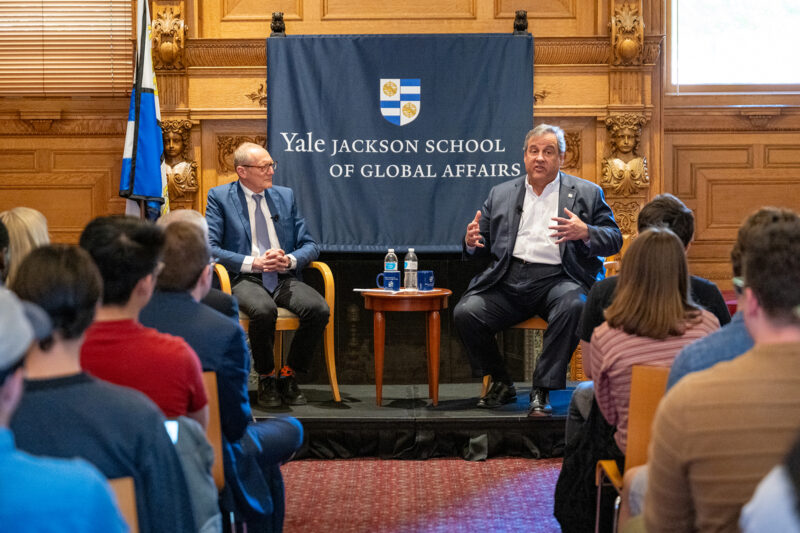On April 25, the Jackson School of Global Affairs hosted a conversation with Chris Christie, the former governor of New Jersey and Republican presidential candidate, about the current state and future of American politics.
A former federal prosecutor, Christie served two terms as governor from 2010 to 2018. In 2016, he ran for president as a Republican, positioning himself as a vocal opponent of eventual nominee Donald Trump. He entered the race for the presidency again ahead of the November 2024 election but withdrew in January.
In his candid remarks, moderated by Jackson Dean Jim Levinsohn, Christie admitted that Republicans made “flawed strategic decisions” in the 2016 primaries, where candidates focused on attacking each other for a chance to face Trump one-on-one for the nomination.
“That was the conventional wisdom of the candidates and our campaign teams — and we were all wrong,” Christie said. “By the time we got through, [Trump] had already won.”
After dropping out, Christie endorsed Trump for president in an effort to defeat Democratic nominee Hillary Clinton and, he said, in hopes that he could help make Trump a better candidate and president. “It was wrong, and I accept that I made a wrong decision.”
Facing difficult truths is something most of today’s politicians don’t want to do, Christie said. Politicians instead feed into the anger and apathy of the public which, he believes, has led to less civil dialogue that is essential for democracy and functional governance.
“The truth still matters,” Christie said. “Leaders in our political system have abandoned the truth because it’s hard. It’s what we’re seeing on both sides of the aisle and, to me, that’s not what leadership is supposed to be about.”
Asked about the future of the Republican party, Christie said he expects “a splintering” regardless of the outcome of the upcoming election. The coalition that Trump has built is unlikely to be replicated, he said, because of his celebrity status and his willingness to put “anger” ahead of policy. If Trump loses this year, the splinter will create multiple factions within the party that will battle for influence amongst Republicans.
If he wins this year, however, Christie said the splinter will occur in 2028 — but only after a presidential term “with no guardrails.”
“Who is his cabinet going to be? Who is going to tell him no?” asked Christie. “America is too strong and too tough to be destroyed, but it will set back our economy, our military, and our place of power in the world.”
Though the political landscape seems bleak, Christie said the country has seen worse. He encouraged the Yale students in attendance to enter public service for the right reason — to change the political system for the benefit of others.
“Your motivation to be in public service should be wanting to accomplish something great,” Christie said. “It has to be in your heart. Be true to yourself about where and how you can have the greatest impact.”
